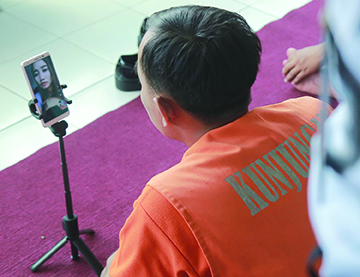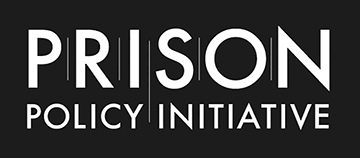by Robert Davis
While county jails across the country were restricting inmate phone calls, video chats with family members, and in-person visits because of COVID-19, staff at the Denver County Jail found new ways to keep their inmates connected to their systems of support.

Relying on mobile hotspots for Wi-Fi, jail staff allowed inmates to use laptops and tablets to converse with their support system outside the jail, at times for free or at a reduced rate.
Funding for the program came from a $340,000 grant from the Caring for Colorado Foundation and Denver City Council, which approved the purchase of additional video and phone monitoring software from Securus Technology, LLC, less than one month after Mayor Hancock issued his public health emergency declaration in March.
Major Rick Guerrero, who oversees operations of the county jail, credits the decision to decrease the inmate population and the facilities’ sanitation protocols were the keys to successfully implementing this program.
“We are very sensitive to the needs of our community and those in our care, especially in uncertain times like during the pandemic,” he told the Glendale Cherry Creek Chronicle in an interview. “That’s why it was so important for us to build strong bridges and make sure inmates didn’t lose their ability to connect with the outside world.”
A report authored by the Prison Policy Initiative (PPI) in September found the pandemic caused detention facilities in several states to restrict inmate communication programs like free phone and video calls and family visits.
“The stress of the pandemic means that most families need more communication than normal,” the report reads. “People with friends or family behind bars need to stay up to date on their loved ones’ health and provide emotional support, especially given that chronic illnesses that make people vulnerable to the virus are more common behind bars.”

Carrie Stanley, DSD’s program director, added another layer to this analysis, describing the responses as counterproductive and especially harmful to inmates with mental health or substance abuse issues facing strenuous reentry programs.
“People are worried about what was happening in the community, about how to connect with people over the internet versus going into their offices,” she told the Chronicle. “Successful reentry programs rely on keeping inmates in connection with positive support systems.”
Phone Calls
The report found county jails in states like Alaska, Pennsylvania, and Vermont, that had completely ended phone calls for their inmates.
Meanwhile the phone lines at Denver’s Van Cise-Simonet Detention Center remained in operation from 9 a.m. to 9 p.m. daily, even when the jail experienced its most serious COVID outbreaks over the summer.
Inmates placed in administrative segregation were allowed the same communication privileges as inmates in general population.
Guerrero says the lower inmate counts allowed county jail staff to closely ensure inmates practiced social distancing at the phones. Inmates and staff also split responsibility for cleaning the phones three to four times per day.
However, increased supervision was not the only cost borne by connecting inmates with their support systems. PPI’s report found that “one in three families with an incarcerated loved one go into debt paying for phone calls and visits, and half struggle to pay for basic housing and food needs.”
Securus charges a fee per minute usage to inmates who call their families via telephone or video service. The average cost of a 15-minute call in Colorado is $14.85, well above the national average cost of $5.74, according to the Prison Policy Initiative.
In Denver, phone calls cost $.08 per minute and $9 for a 30-minute video call.
“In-person” Visits
It’s been 15 years since inmates in Denver County Jail could hug their loved ones during visits. Instead, visitors come to the jail lobby to use a phone and video system that connects to the housing units.

Under normal circumstances, these visits are 30 minutes long and are only allowed from Friday to Sunday between 12 and 8 p.m. Visits at the Downtown Detention Center are similarly restricted.
Once the pandemic hit in late March, DSD restricted visitor access to their lobby and increased inmate visitations to 7 days per week, thereby creating a need to expand their remote visit capabilities.
Securus provided DSD with coupons for free virtual visits so families without computers can still visit with inmates. Between April and June, DSD gave out 450 coupons, according to Stanley.
Securus also provided compassion credits to inmates with family members who were ill or who had passed for free video calls.
“The people in our care often don’t have access to their family members for most of the time they’re here,” Stanley said. “In terms of the pandemic, we saw an increase in inmate family members who got sick or passed.”
To help inmates grieve, DSD individualized its chaplain services. Before the pandemic, as many as 20 inmates could see the Chaplain at the same time. Now, DSD only allows eight in a room together and has suspended all volunteer religious providers.
Kites And Staff Communications
Inmates don’t just communicate with people outside detention facilities. In Denver, inmates use a color-coded kite system to communicate their needs with jail staff. Inmates submit a yellow kite to communicate a problem with staff and a green kite for health services requests, according to the inmate handbook.
Kites are sent to responsive departments depending on the request. For example, all kites concerning communications with the phones or video chat lines are directed to the Accounting Department.
Stanley said the jail maintained enough staff to process kite requests, and improved their efficiency in many cases.
“Our people were keenly aware of the need for communication. There’s really a lot of compassion on this team,” she said. “We know this pandemic has increased anxiety for many people in our care, so we had to increase our efforts.”
Stanley and her team also addressed inmate anxieties by increasing their rounds in the housing units from once a month to once per week. This allowed program staff to take a more personalized approach to their jobs, and gave inmates more chances to ask program staff about reentry programs, lining up a safe home, and other means of survival outside of jail.
“The pandemic has really taught us that people respond better if you focus on them as an individual rather than as a group or housing unit,” Stanley said.
